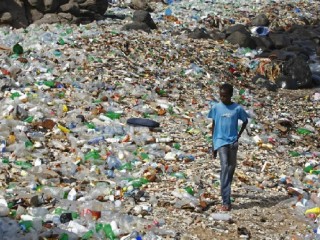Project Results:
The Greening Plastic project
Recycling plastic waste into drip irrigation systems
About the project
This project piloted the production of drip irrigation systems in Thies, Senegal, partially from recycled material by the Senegalese startup DMS. It combined the challenges of waste production, environmental degradation and increasing demand for agricultural products. This project operated in the water-food-waste nexus which makes farmers more resilient. At the same time, it was giving insight in the water and soil quality by using passive sampling technique.
Key results
• The drip irrigation system uses water three times more efficiently compared to traditional irrigation systems.
• 150 tonnes of plastic waste was removed from the environment during the project for reuse as drip-irrigation tubes.
• This offset an estimated 300 tonnes of carbon dioxide emissions.
• 5.5 kg of plastic waste can produce enough drip-irrigation tubes to service a small farming plot of 10 x 10 metres.
Tips for the future
• Think large: a production unit for recycling waste plastic into irrigration tubes needs space to perform well.
• The technique of passive sampling was used to monitor whether additives deriving from the drip irrigation systems could be found in the water and soil in which they are installed. Transfer of a technique like this work out best if closely accompanied by trained personnel.
Potential for growth
The Greening Plastic Project has allowed DMS to successfully establish itself as a renowned recycling company and producer of plastic tubes. Apart from that, DMS is increasingly known as an enterprise for technical agricultural services, such as advice on irrigation options and installation of drip-irrigation. They are now marketing their own tubes which are made of 100% Senegalese recycled plastic. The project resulted in a collaboration agreement with the environmental and toxicological lab Ceres Locustox, who is interested in apply passive sampling in their institute.
Project partners
Deltares, DMS, LVIA
Period
September 2016 - September 2018
Last project updates
Background
Senegal, like many other developing nations, faces a change in domestic consumption patterns producing thousands tons of plastic waste annually. Recent researches, conducted by PNGD (Plan National de Gestion de Déchets) in 25 urban areas of Senegal, register a total production of 1,500 tons/day of solid waste, with 10% represented by plastic litter. The latter is abandoned on the roads’ sides, contributing to soil and surface water contamination, clogging of rainwater drains and standing as a potential source of intoxication for animals and children. Despite remarking the lack of data, the Ministry of the Environment estimates a quantity of 70,000 tons of plastic waste abandoned in the country. Faced with a weak institutional capacity to deal with the collection and treatment of this plastic waste, and the contaminated water and soil resources, urban solid waste management represents nowadays a major societal and environmental challenge for most Senegalese cities such as Dakar, Thies, St Louis and Kaolack.
At the same time, demand for agricultural products in tropical countries like Senegal is on the rise. Changes in social structure, increase of customers’ purchasing power and the intensification of international trade are all factors boosting domestic demand for and export of fruits and vegetables. Meanwhile, increased climate variability, intensification of droughts and floods, and decreasing soil fertility pose a challenge on the coping capacity of thousands of small farmers who increasingly are faced with the effects of climate vulnerability and risk of crop failure. This situation – shared by various countries in Africa and other world regions – calls for the adoption of farmer-oriented solutions to decrease their exposure to climate-related risk. Such solutions should be attractive enough to incentivize farmers to adopt them autonomously, and for this same reason, they should be financially affordable and rentable on the long-term.
Project Plan
The Greening Plastic Project will
1. support a Senegalese SME (DMS) in expanding its recycled plastic production with a line of drip irrigation systems (DIS);
2. train small, medium and large-scale farmers in the use and maintenance of these systems; and
3. support institutes responsible for managing the environment with training in innovative approaches for environmental quality monitoring using passive sampling techniques.
Target group
The Greening Plastic project's target groups are the small, medium and large-scale farmers who can potentially switch to drip irrigation;
Institutes responsible for environmental management or research into environmental quality are targeted to increase awareness of the importance of environmental quality monitoring and showing the option of using passive Sampling techniques.
Sustainability
Project sustainability is guaranteed by multiple factors:
* The Greening Plastic project aims to put in place a 'social' enterprice: a business which creates benefits for more parties than just the business owner. It is expected that DMS' revenues will increase as a result of the greening plastic project, possibly allowing more growth and expansion both in production and in market share in the future.
* As for the farmers, we sincerely hope that introducing the drip irrigation kits will prove to be a safe investment, increasing their revenue as well and allowing them to further invest in their agricultural enterprise or other areas.
* The Greening Plastic Project does not focus on making available material (DIS kits) only, but will also provide training and services. These are aimed at the post-project sustainability, providing farmers with the necessary knowledge and resources to maintain their DIS even after project completion. The services are a pilot and are expected to be provided by DMS when the project is over.
* LVIA's long term presence in Senegal (since 1973) is expected to continue in the future. LVIA has a long track record in Senegal and there is no reason why they should end their activities in the area of urban environmental quality in the country in the coming years. To the contrary, it is likely that they will keep building on existing experience and projects, including the Greening Plastic Project.
* We expect institutional capacities of environmental organisations to increase in the coming years, increasing their potential interest in using and implementing passive samples, or moving to more expensive environmental quality monitoring techniques. The data collected with passive samples will however provide valuable information of the state of the environment and processes at play.
Overview of Goals
The Greening Plastic project will focus on the use of recycled plastic for the production of drip irrigation systems (DIS). These will help farmers to save water while improving crop yields and providing more resilient to climate change-induced periods of dry spells and droughts. This will be pursued while:
1. a cleaner environment where to live;
2. Promoting soil and water quality monitoring using passive sampling techniques among relevant institutes;
3. connecting production of DIS kits to existing businesses involved in the processing and commercialization of recycled plastic products (i.e. rainwater harvesting tanks);
4. training small, medium and large-scale farmers in the use and maintenance of climate-friendly water-saving technologies;
5. offering clients a reliable and customer-oriented service to ensure continuous use of the products being sold, and the services being offered.

